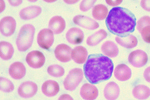 FLICKR, ED UTHMANCombining cellular reprogramming approaches with a method to genetically modify patients’ own T cells, scientists have come up with a way to mass-produce an unlimited quantity of cancer-fighting cells.
FLICKR, ED UTHMANCombining cellular reprogramming approaches with a method to genetically modify patients’ own T cells, scientists have come up with a way to mass-produce an unlimited quantity of cancer-fighting cells.
Memorial Sloan-Kettering Cancer Center’s Michel Sadelain and his colleagues this week showed that these genetically engineered cells, which resemble natural immune cells, effectively eliminated tumors in a mouse model of lymphoma. With this method, Sadelain told The Scientist, “there’s flexibility here for redirecting their specificity towards anything that you want.”
The next step, he added, is to find out more about the biological nature of these T cell-like cells and assess their safety.
 FLICKR, GÁLIBOA Gram-negative microbe typically found in the oral cavity can spur inflammatory and oncogeneic responses in the gut, causing colorectal cancer. Two separate teams this week identified how Fusobacterium nucleatum promotes cancer development, and pointed to potential diagnostic and therapeutic applications. The researchers cautioned, though, that targeting F. nucleatum alone is unlikely to be useful. “We have evolved beyond the stage of ‘one bacteria, one disease.’ I think we will still find those keystone pathogens that play a key role in those diseases, [but] with microbiome studies . . . mechanistic studies are very important,” Case Western Reserve University’s Yiping Han told The Scientist.
FLICKR, GÁLIBOA Gram-negative microbe typically found in the oral cavity can spur inflammatory and oncogeneic responses in the gut, causing colorectal cancer. Two separate teams this week identified how Fusobacterium nucleatum promotes cancer development, and pointed to potential diagnostic and therapeutic applications. The researchers cautioned, though, that targeting F. nucleatum alone is unlikely to be useful. “We have evolved beyond the stage of ‘one bacteria, one disease.’ I think we will still find those keystone pathogens that play a key role in those diseases, [but] with microbiome studies . . . mechanistic studies are very important,” Case Western Reserve University’s Yiping Han told The Scientist.
 FLICKR, UKHOMEOFFICEAn HIV transcription protein could help heighten cocaine’s high, a rat study has found. While all mice given the drug showed an affinity for it, those expressing the virus’s Tat gene showed the greatest propensity to seek out the stimulant. Additionally, these mice were more hyperactive when on the substance than those without the protein. “Exposure to Tat protein may increase vulnerability not only to the rewarding effects of drugs of abuse, but could increase vulnerability to relapse,” study coauthor Jay McLaughlin, from the Torrey Pines Institute for Molecular Studies, told The Scientist. The researchers noted that their findings could help explain why humans who are infected with HIV and use drugs tend to suffer more neurological and cognitive decline than those who are not infected or don’t use.
FLICKR, UKHOMEOFFICEAn HIV transcription protein could help heighten cocaine’s high, a rat study has found. While all mice given the drug showed an affinity for it, those expressing the virus’s Tat gene showed the greatest propensity to seek out the stimulant. Additionally, these mice were more hyperactive when on the substance than those without the protein. “Exposure to Tat protein may increase vulnerability not only to the rewarding effects of drugs of abuse, but could increase vulnerability to relapse,” study coauthor Jay McLaughlin, from the Torrey Pines Institute for Molecular Studies, told The Scientist. The researchers noted that their findings could help explain why humans who are infected with HIV and use drugs tend to suffer more neurological and cognitive decline than those who are not infected or don’t use.
 WIKIMEDIA, LOTUS HEADSnarled communication between the brain and the gut may be one reason high-fat foods seem highly addictive, researchers have found. Yale School of Medicine’s Ivan de Araujo this week showed that the lipid oleoylethanolamide affects dopamine signaling emanating from the gut, and that a chronic high-fat diet suppresses production of the lipid. Diminished supplies of oleoylethanolamide cause the brain to be essentially “blind to the presence of calories in the gut,” Araujo told The Scientist. When oleoylethanolamide was restored in mice fed a high-fat diet, so too was their dopamine signaling.
WIKIMEDIA, LOTUS HEADSnarled communication between the brain and the gut may be one reason high-fat foods seem highly addictive, researchers have found. Yale School of Medicine’s Ivan de Araujo this week showed that the lipid oleoylethanolamide affects dopamine signaling emanating from the gut, and that a chronic high-fat diet suppresses production of the lipid. Diminished supplies of oleoylethanolamide cause the brain to be essentially “blind to the presence of calories in the gut,” Araujo told The Scientist. When oleoylethanolamide was restored in mice fed a high-fat diet, so too was their dopamine signaling.



















